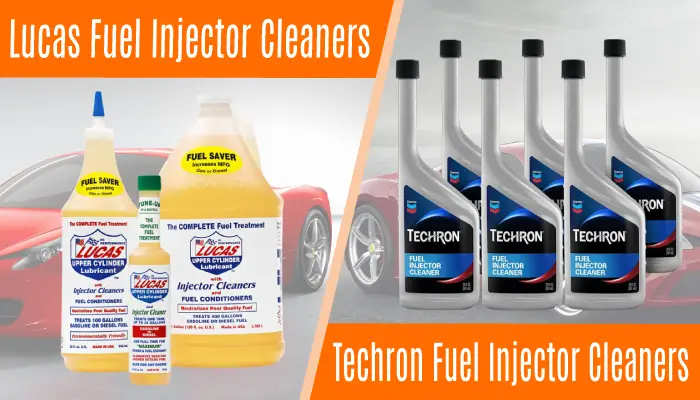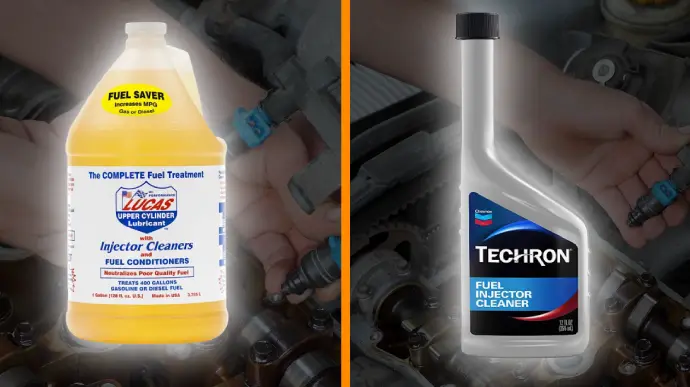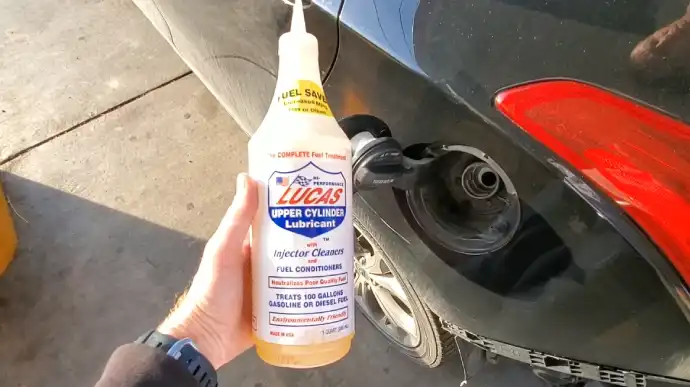Physical Address
304 North Cardinal St.
Dorchester Center, MA 02124
Physical Address
304 North Cardinal St.
Dorchester Center, MA 02124

Using a fuel injector cleaner is an important step in maintaining your vehicle’s performance, and Lucas and Techron are two of the most popular options. Both fuel injector cleaners serve a similar purpose, but there are significant differences between the two.
The Techron is primarily designed to clean heavy-duty fuel injectors and carburetors with a focus on removing harmful deposits.
Conversely, Lucas UCL serves a dual purpose as a lubricant and fuel dispersant with some cleaning abilities.
We will explore the differences between Lucas and Techron fuel system cleaners in detail so you can decide which product is appropriate for your vehicle.

Here are the key contrasts between Lucas and Techron fuel injector cleaner products, each offering unique features and benefits for maintaining your vehicle’s fuel system.
Techron is primarily designed as a heavy-duty injector cleaner that emphasizes cleaning capabilities. Its main purpose is to remove harmful deposits from clogged fuel injectors and carburetors. To improve fuel flow and performance, Techron breaks down and dissolves carbon deposits, varnish, and other contaminants.
On the other hand, Lucas UCL functions as a lubricant as well as a fuel dispersant with some cleaning properties. Its purpose isn’t only to clean but also to provide lubrication and maintain the fuel system. Lucas UCL helps prevent rust and corrosion, reduce wear and tear, and improve fuel efficiency.
Techron is specifically formulated for use with gasoline engines, making it ideal for improving fuel system performance and reducing deposits in gasoline-powered vehicles. However, it isn’t recommended for use in diesel engines.
Conversely, Lucas UCL offers a broader range of applications as it can be used with both gasoline and diesel engines. This makes Lucas UCL a more versatile option for cleaning and maintaining fuel injectors in various types of vehicles.
Whether you have a gasoline or diesel engine, choosing the fuel injector cleaner compatible with your specific fuel type is crucial to ensure optimal performance and efficiency.
Lucas and Techron fuel injector cleaners differ in terms of their cleaning speed. Techron is known for its ability to quickly clean fuel injectors and carburetors in one tankful of fuel, providing rapid results. This may appeal to users looking for immediate improvement in their vehicle’s performance.
In contrast, Lucas UCL may require a longer period of time to produce noticeable cleaning results. It’s often used in smaller, more frequent doses, offering a more gradual cleaning effect. This approach may be preferable for those looking for ongoing maintenance and continuous improvement in fuel system performance.
Techron, known for its ability to reduce emissions and improve engine performance, is a valuable choice for users seeking to pass smog tests or comply with emission regulations. Its effectiveness in controlling emissions is well-documented and widely promoted.
Conversely, while Lucas UCL has capabilities to improve fuel combustion and reduce emissions, it may not be as extensively studied or marketed specifically for emissions control. Therefore, if passing a smog test or maintaining low emissions is your primary concern, Techron may be the more reliable choice.
However, further research and evaluation of Lucas UCL’s effectiveness in emission reduction may be necessary.
Mercedes-Benz has approved Techron as a fuel system cleaner, which is a significant endorsement. The approval of Techron by Mercedes-Benz speaks volumes about its effectiveness and quality due to its high standards and rigorous testing processes.
When a reputable automotive manufacturer like Mercedes-Benz approves a fuel system cleaner, it indicates that the product has been thoroughly tested and proven to meet the strict requirements of modern engines.
This endorsement gives consumers peace of mind, knowing that they’re using a fuel injector cleaner that has been trusted by a prestigious brand like Mercedes-Benz.
In contrast, Lucas UCL doesn’t have Mercedes-Benz approval, making Techron a more appealing choice for Mercedes-Benz owners looking for a reliable and approved fuel system cleaner.
To determine the cost and value differences among Lucas and Techron fuel injector cleaners, consider evaluating their respective prices and benefits.
Techron is often perceived as a more premium and slightly higher-priced product. This may affect users’ decisions based on their budget and perceived value.
On the other hand, Lucas UCL is viewed as a cost-effective option, making it appealing to users who want to maintain their fuel system without breaking the bank.
Regarding value, Techron is known for its ability to clean and protect fuel injectors, improve fuel economy, and reduce emissions. Conversely, Lucas UCL offers similar benefits at a more affordable price point.
Ultimately, the choice between Lucas and Techron will depend on your budget and the level of performance you desire for your fuel system.
| Aspect | Techron Fuel Injector Cleaner | Lucas UCL Fuel Treatment |
| Purpose | Heavy-duty injector cleaner with a focus on cleaning capabilities. | Serves as a lubricant and fuel dispersant |
| Fuel Compatibility | Formulated for gasoline engines; not recommended for diesel. | Versatile; suitable for both gasoline and diesel engines. |
| Recommended Usage | Typically every 3-6 months for maintaining clean injectors. | Used more frequently but in smaller doses, suggesting more frequent applications. |
| Cleaning Speed | Known for quick cleaning in one tankful, appealing for rapid results. | May take longer to show noticeable cleaning effects, preferable for gradual, ongoing maintenance. |
| Smog Test and Emissions | Effective in reducing emissions and improving engine performance. | Emissions benefits, but not as well-documented or promoted for emissions control. |
| Mercedes-Benz Approval | Approved by Mercedes-Benz as a fuel system cleaner. | No similar mention of Mercedes-Benz approval. |
| Cost and Value | Perceived as a premium product, potentially higher-priced. | Viewed as a cost-effective option, appealing for budget-conscious users. |

Use the recommended dosage of Lucas fuel injector cleaner based on the size of your fuel tank. For every 10 gallons of gasoline or diesel fuel in your vehicle, add 2-3 ounces of Lucas Fuel Treatment. Simply pour the specified amount directly into your fuel tank.
It’s important to note that exceeding the recommended dosage isn’t harmful to your vehicle, providing some flexibility. For example, a 5.25-ounce bottle can treat up to 25 gallons of fuel, allowing you to tailor the treatment to your specific fuel tank size.
Following this dosage guideline will ensure optimal results and performance for your engine.
To achieve the best results, using Techron fuel system cleaner every 3,000 miles (4,800 km) or at your scheduled oil change intervals is recommended. It’s crucial not to use it more than twice per oil change.
As a result of following this regular usage pattern, you can effectively maintain a clean fuel system and prevent the buildup of carbon deposits. This, in turn, ensures optimal engine performance and fuel efficiency.
Using Techron Complete Fuel System Cleaner at the recommended intervals will help keep your fuel system clean and functioning at its best, allowing you to enjoy a smoother and more efficient driving experience.
When choosing between Lucas and Techron fuel injector cleaners, consider your specific vehicle’s needs and your priorities.
Techron, known for its efficiency in cleaning and emissions control, is a great choice for those looking for a fast-acting solution and seeking to pass smog tests. It’s particularly appealing if you have a gasoline engine.
On the other hand, Lucas UCL offers versatility, cost-effectiveness, and the added benefit of lubrication. It may be a preferred option for budget-conscious users or those with diesel engines.
The choice depends on your individual preferences, budget, and the level of maintenance you seek for your vehicle’s fuel system.